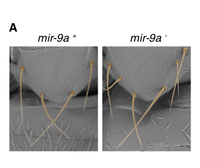
Repressive gene regulation synchronizes development with cellular metabolism
Abstract
Metabolic conditions affect the developmental tempo of animals. Developmental gene regulatory networks (GRNs) must therefore synchronize their dynamics with a variable timescale. We find that layered repression of genes couples GRN output with variable metabolism. When repressors of transcription or mRNA and protein stability are lost, fewer errors in Drosophila development occur when metabolism is lowered. We demonstrate the universality of this phenomenon by eliminating the entire micro- RNA family of repressors and find that development to maturity can be largely rescued when metabolism is reduced. Using a mathematical model that replicates GRN dynamics, we find that lowering metabolism suppresses the emergence of developmental errors by curtailing the influence of auxiliary repressors on GRN output. We experimentally show that gene expression dynamics are less affected by loss of repressors when metabolism is reduced. Thus, layered repression provides robustness through error suppression and may provide an evolutionary route to a shorter reproductive cycle.